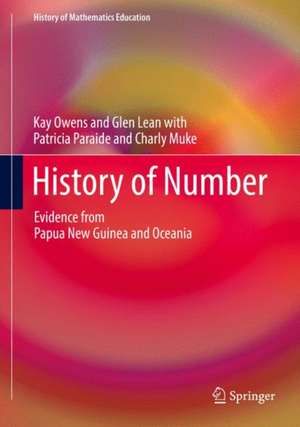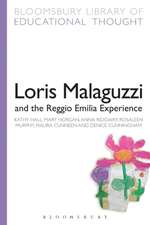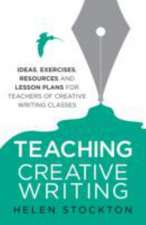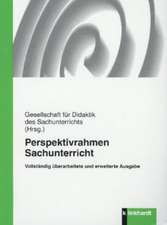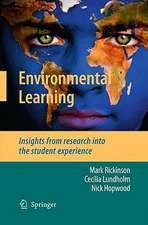History of Number: Evidence from Papua New Guinea and Oceania: History of Mathematics Education
Autor Kay Owens, Glen Lean, Patricia Paraide, Charly Mukeen Limba Engleză Hardback – 8 noi 2017
Among the topicscovered:
- The diversity of counting system cycles, where they were established, and how they may have developed.
- A detailed exploration of number systems other than base 10 systems including: 2-cycle, 5-cycle, 4- and 6-cycle systems, and body-part tally systems.
- Research collected from major studies such as Geoff Smith's and Sue Holzknecht’s studies of Morobe Province's multiple counting systems, Charly Muke's study of counting in the Wahgi Valley in the Jiwaka Province, and Patricia Paraide's documentation of the number and measurement knowledge of her Tolai community.
- The implications of viewing early numeracy in the light of this book’s research, and ways of catering to diversity in mathematics education.
| Toate formatele și edițiile | Preț | Express |
|---|---|---|
| Paperback (1) | 706.53 lei 38-44 zile | |
| Springer International Publishing – 5 sep 2018 | 706.53 lei 38-44 zile | |
| Hardback (1) | 803.53 lei 6-8 săpt. | |
| Springer International Publishing – 8 noi 2017 | 803.53 lei 6-8 săpt. |
Preț: 803.53 lei
Preț vechi: 979.92 lei
-18% Nou
Puncte Express: 1205
Preț estimativ în valută:
153.76€ • 160.86$ • 127.73£
153.76€ • 160.86$ • 127.73£
Carte tipărită la comandă
Livrare economică 02-16 aprilie
Preluare comenzi: 021 569.72.76
Specificații
ISBN-13: 9783319454825
ISBN-10: 331945482X
Pagini: 336
Ilustrații: XXVII, 461 p. 51 illus., 16 illus. in color.
Dimensiuni: 178 x 254 mm
Greutate: 1.06 kg
Ediția:1st ed. 2018
Editura: Springer International Publishing
Colecția Springer
Seria History of Mathematics Education
Locul publicării:Cham, Switzerland
ISBN-10: 331945482X
Pagini: 336
Ilustrații: XXVII, 461 p. 51 illus., 16 illus. in color.
Dimensiuni: 178 x 254 mm
Greutate: 1.06 kg
Ediția:1st ed. 2018
Editura: Springer International Publishing
Colecția Springer
Seria History of Mathematics Education
Locul publicării:Cham, Switzerland
Cuprins
An Overview of the Studies, Papua New Guinea, Oceania, Languages and Migrations.- The Languages Studied by Lean and his Analysis of Counting Systems.- 2-Cycle Systems Including Some Digit Tally Systems.- Body-Part Tally Systems.- 5-Cycle Systems.- 10-Cycle Systems.- 4- and 6-Cycle Systems.- Number and Counting in Context Including Classifications.- Testing the Diffusion Theory.- Towards a Prehistory of Number.- Indigenous and Western Knowledge.- Integration of Indigenous Knowledge in Formal Learning Environments.- Rewriting the History of Number from Papua New Guinea and Oceania Evidence.
Notă biografică
Kay Owens chose a lecturing position at Charles Sturt University in Dubbo in the School of Teacher Education in 2003 after serving for 15 years at the University of Western Sydney where she was a Senior Lecturer. During that period she gained her PhD in mathematics education on young children engaged in spatial problem solving. She has a long career internationally with 15 years in Papua New Guinea where she held a lectureship in mathematics at the PNG University of Technology and a Head of Department position at Balob Teachers College. She was also selected for a Swedish lecturer exchange to Gothenburg University for the enhancement of tertiary education in that country and for a Masters Course at the Inter-University Institute in Macau. Kay has continued her research working with colleagues in Papua New Guinea and Sweden with a focus on ethnomathematics (mathematics, language and culture) and space, geometry and measurement education. Her international projects have been funded byUSA National Science Foundation, AusAid and her universities competitive grants while her local and state projects have had funding from state and federal governments and non-government agencies and her universities.
Patricia Paraide is an associate professor in Education Research at Divine Word University. She received her PhD at Deakin University in 2009. She has published a number of papers on education in Papua New Guinea, including mathematics education, and has presented at several conferences internationally. Her expertise and interests include language and linguistics, literacy across the lifespan, and education and indigenous knowledge.
Patricia Paraide is an associate professor in Education Research at Divine Word University. She received her PhD at Deakin University in 2009. She has published a number of papers on education in Papua New Guinea, including mathematics education, and has presented at several conferences internationally. Her expertise and interests include language and linguistics, literacy across the lifespan, and education and indigenous knowledge.
Textul de pe ultima copertă
This unique volume presents an ecocultural and embodied perspective on understanding numbers and their history in indigenous communities. The book focuses on research done in Papua New Guinea, and will help educators understand humanity's use of numbers, and their development and change. The authors focus on indigenous mathematics education in the early years and shine light on the unique processes and number systems of non-European styled cultural classrooms. This new perspective for mathematics education challenges educators who have not heard about the history of number outside of Western traditions, and can help them develop a rich cultural competence in their own practice. Featured in this invaluable resource is the data and analysis that chief researcher Glendon Angove Lean collected while living in Papua New Guinea before his death in 1995.
Among the Topics Covered:
- The diversity of counting system cycles, where they were established, and how they may have developed. - A detailed exploration of number systems other than base 10 systems including: 2-cycle, 5-cycle, 4- and 6-cycle systems, and body-part tally systems.
- Research collected from major studies such as Geoff Smith's study of Morobe's counting systems, Charly Muke's study of counting in the Waghi Valley in the Jiwaka Province, and Patricia Paraide's documentation of the number and measurement knowledge of her Tolai community.
- The implications of viewing early numeracy, and ways of catering to diversity in mathematics education.
In this volume Kay Owens draws on recent research from diverse fields such as linguistics and archaeology to present their exegesis on the history of number. Researchers and educators interested in the history of mathematical sciences will find History of Number: Evidence from Papua New Guinea and Oceania to be an invaluable resource.
Among the Topics Covered:
- The diversity of counting system cycles, where they were established, and how they may have developed. - A detailed exploration of number systems other than base 10 systems including: 2-cycle, 5-cycle, 4- and 6-cycle systems, and body-part tally systems.
- Research collected from major studies such as Geoff Smith's study of Morobe's counting systems, Charly Muke's study of counting in the Waghi Valley in the Jiwaka Province, and Patricia Paraide's documentation of the number and measurement knowledge of her Tolai community.
- The implications of viewing early numeracy, and ways of catering to diversity in mathematics education.
In this volume Kay Owens draws on recent research from diverse fields such as linguistics and archaeology to present their exegesis on the history of number. Researchers and educators interested in the history of mathematical sciences will find History of Number: Evidence from Papua New Guinea and Oceania to be an invaluable resource.
Caracteristici
Details number systems other than base 10 systems Outlines global perspectives on the history of mathematics education Integrates sociological approaches into mathematics education to enhance learning Includes supplementary material: sn.pub/extras
